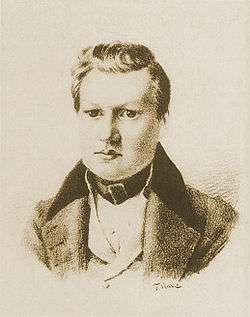Rudolf Friedrich Kurz
| Rudolph Friederich Kurz | |
|---|---|
|
Self-portrait | |
| Born |
January 8, 1818. Bern, Switzerland |
| Died |
October 16, 1871 (aged 53) Bern, Switzerland |
| Occupation | writer, animal and landscape painter, teacher |
| Language | German |
| Nationality | Swiss |
| Alma mater | Bern University |
| Notable works | The Journal of Rudolph Friederich Kurz |
Rudolph Friederich Kurz (1818–1871) was a Swiss painter and writer who ventured to United States in order to paint and study the native Americans. He is mostly known on account of his journals, in which he presents an account of and an interesting commentary on life in the mid-19th century along the Mississippi and Missouri.[1]
Life
Born in 1818 in Langnau im Emmental to Johannes Kurz (who moved to Langnau from Reutlingen, Germany in 1806) and Maria Stooss. He attended drawing classes at the Bern gymnasium under Joseph Volmar. In 1838 he travelled to Paris to further his studies; thereupon he met Alexander von Humboldt and Karl Bodmer. Upon returning to Bern (1842) he became head of painting class at the Fellenberg Institute in Hofwil. Again he left Bern (and the Old Continent) in 1846 setting sails for America.
The venture along the banks of Mississippi and Missouri was noted and reviewed in his journals. The time spent in the bustling frontier communities proved to be both fruitful and dangerous—he tried his luck in mining and horse trade (with no successes). In 1850 he married Witthae, daughter to Kirutshe, leader of an Iowa Indian group but the marriage did not last—Witthae ran away after two weeks, pining for her people.
Eventually, after four years of struggle to pay board and lodging he met Alexander Culbertson in Council Bluffs, in June 1851 and embarked the steamer St. Ange to Fort Fort Berthold work for the American Fur Company.[2] While Kurz worked as a clerk, he also sketched scenes in the area, despite being told that the Mandan and Hidatsa people considered painting and drawing would bring ill luck. During the summer, cholera broke out among the Indians, and nearly everyone except Kurz became ill. Blame for the sickness began to focus upon the artist, so he fled to Fort Union on August 18, 1851.
In Fort Union, Kurz had better opportunities of indulging in his passion. Bourgeois or manager of the fort, Edwin Thompson Denig commissioned the young Swiss to paint and sketch various persons and places. Many his sketches of Fort Union's interior helped with that fort's partial reconstruction in 1989.
Kurz returned to Bern in 1852 and taught painting, first in the local gymnasium[3] and later, at the closure of his life, at an Art School he established. One of his pupils was Fritz Schenk who later emigrated to the US in 1870 and became agent for the Sioux Indian Reservation at Fort Randall, S.D.
Upon his death on October 16, 1871, Rudolf Friedrich Kurz left a large number of sketches, paintings (some of which were burned by his family due to nudity) and texts as well as a brief dictionary of Native American dialects.
References
- ↑ http://www.germanheritage.com/biographies/atol/kurz.htmlM
- ↑ http://home.att.net/~mman/References.htm#Kurz
- ↑ 'Mr. Kurz was our teacher at the Canton School (in Berne), and while we practised drawing he occasionally related his adventures in the wild west. Cooper's Leatherstocking Tales was our favorite book, and our thin, taciturn teacher so resembled the ideal western hunter, we swarmed to him. Once he invited us to his room on Market street . . . in a corner was an iron bed covered with a buffalo robe, other robes were on the floor; sketches and Indian artifacts covered the walls. He let us sit on a robe and smoke Indian tobacco from an Indian pipe -- we were speechless with pride. Only later did it make us sick.'
- The Journal of Rudolph Friederich Kurz, Bison Books, ISBN 0-8032-5713-9
- Biographical Note on Historisches Lexikon der Schweiz
- Biographical Note on North Dakota Online
